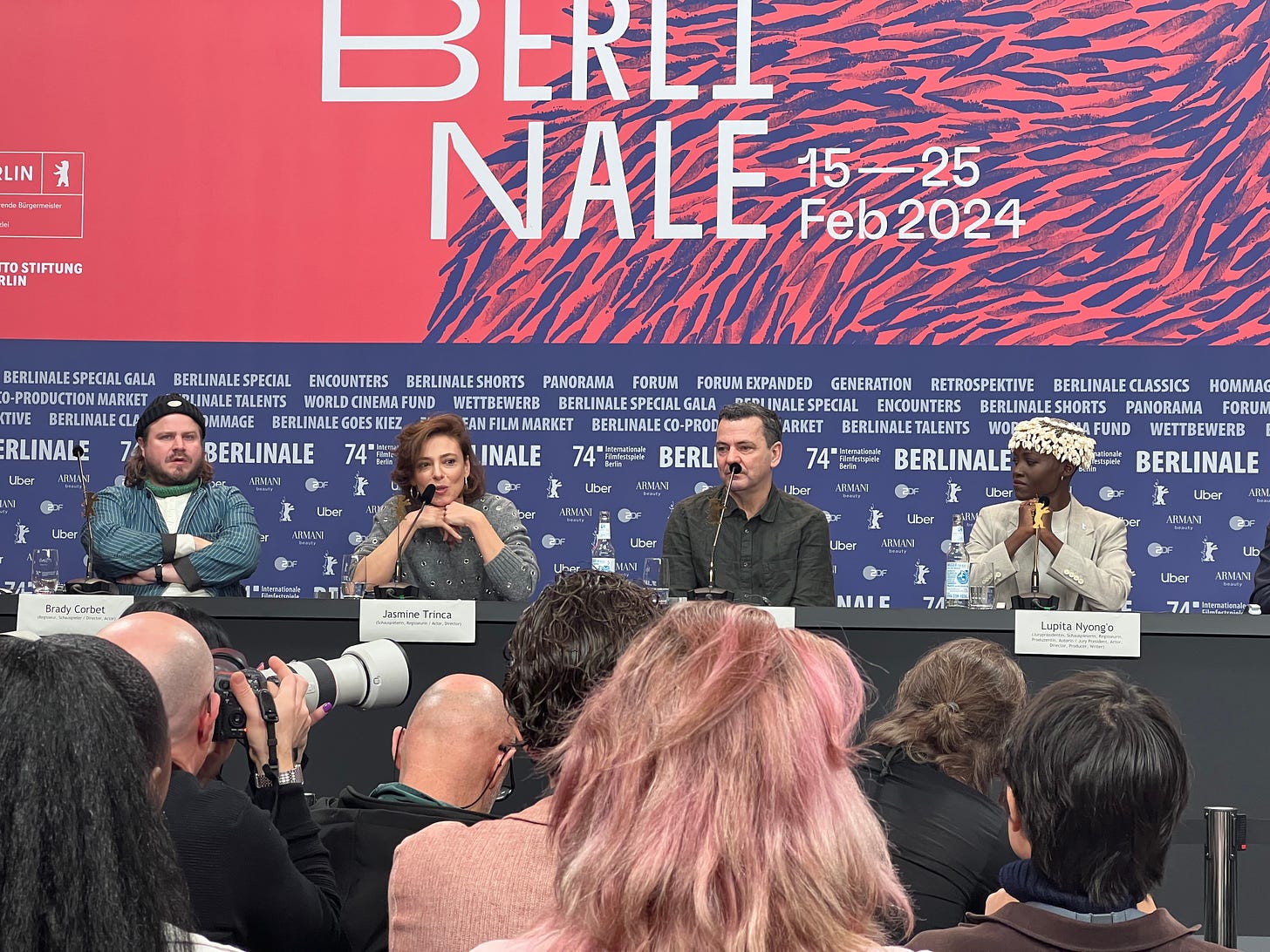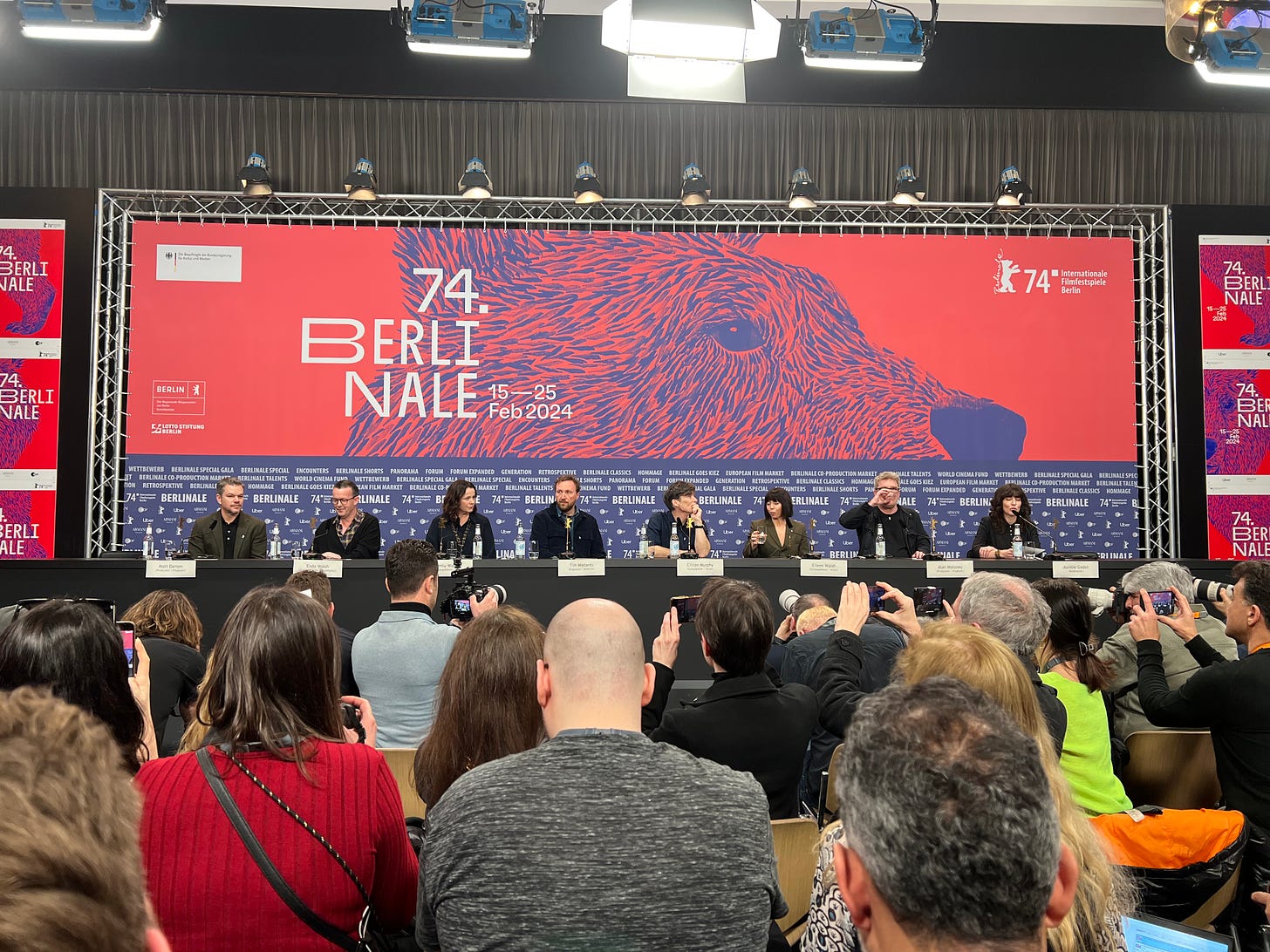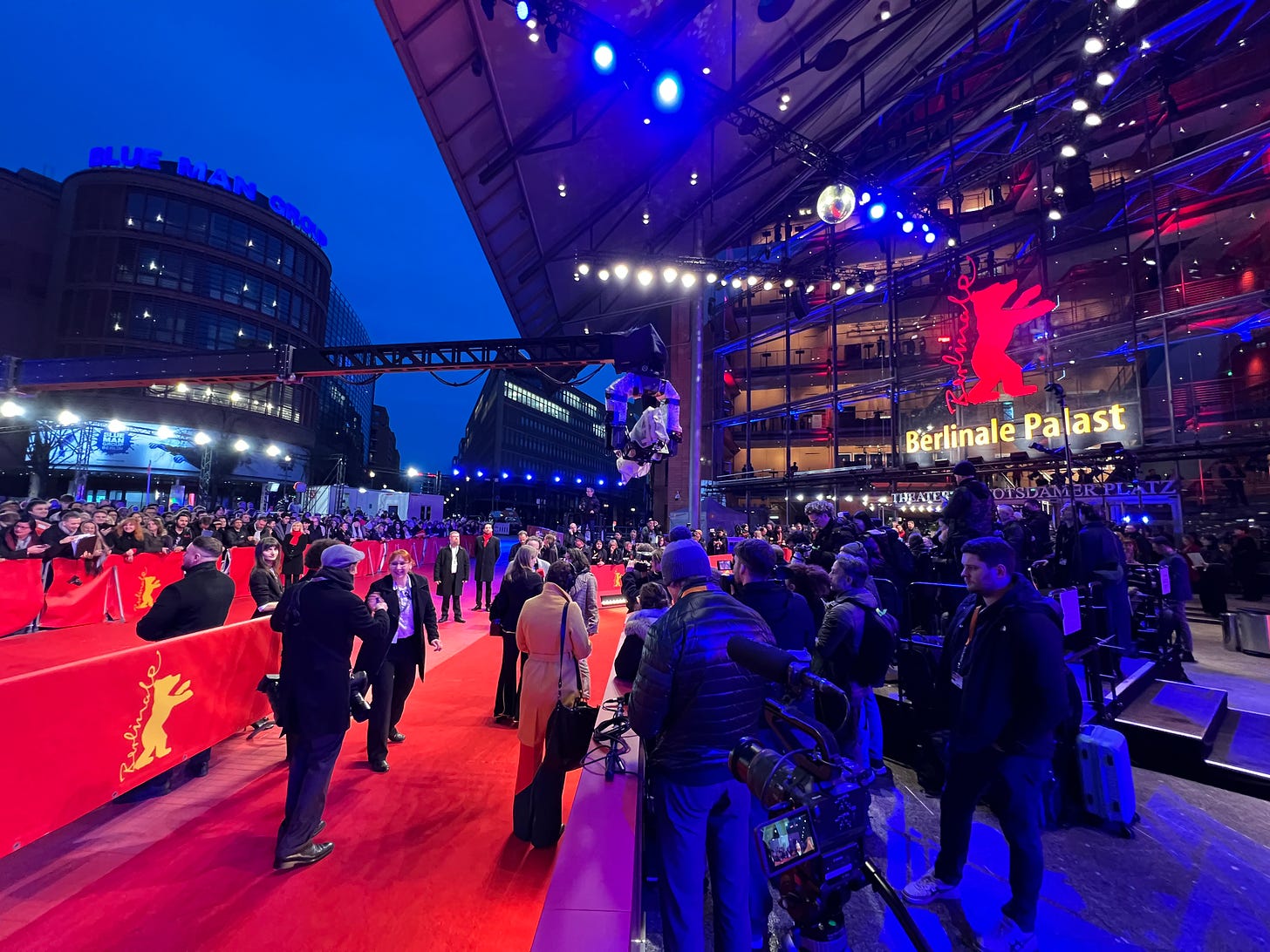Berlinale Tries to be Political, Day 1
In which the jury is unaware how political the festival is, Cillian Murphy shows up in the middle of his Oscar fyc tour, and an old German man yells at me during the opening screening.
Berlinale is different than the other big European film festivals for being open to the public, programs with more political and independent content rather than studio releases and Oscar nominees, and more political engagement because of its location. For these reasons, it’s unlike the glitzy/glamy Cannes and Venice. That’s why German Culture Minister Claudia Roth’s replacement of the highly popular Berlinale artistic director, Carlo Chatrian, (which I covered several days ago) with American Tricia Tuttle, head of the BFI London Film Festival. She was able to successfully increase their numbers (attendance, sponsors, international engagement), which is the reason Roth hand-selected her. Roth wants to bring Berlinale into the competitive zone of Cannes and Venice, but this will be extremely difficult if they want to maintain their commitment to political and independent cinema. Though Roth offers platitudes of retaining it’s political cinema, that all seems to be blah blah blah.
At the press conference for the main international festival jury, a smattering of questions were about how the Berlinale is a political festival. In keeping with the generalized questions, the jury gave equally generalized answers, like when jury president Lupita Nyong'o gave shrugs and sighs multiple times. Asked about what she thinks about the festival being political, as well as the selection of African films and jury members with opposing political views, she prefers deferment; she keeps hearing about how “political” it all is, but she says she’ll wait to see. Christian Petzold, winner of the Grand Jury prize last Berlinale for Afire and Germany’s premier director and representee at this festival, was asked about the AfD invitations/disinvitations. He said that he waited a week to be asked this question but forgot the answer. Audience laughs, some applause. He continued by saying that it’s not a problem having five members of the party, that we shouldn’t be scared of them by disinviting them. A Deadline journo brought it back up several questions later, pressing Nyong’o and Petzold. Nyong’o said she is a foreigner who just arrived 48 hours ago and didn’t know the ins and outs enough to comment. Petzold said not including the politicians would only help them in the end. Protests out in the streets are more important than what a film director has to offer during a festival press conference.
One journo tried spicing up an otherwise lameduck Q&A by saying that Albert Serra, Catalonian director jury member, was a supporter of Putin based on comments (flippantly taken way out of context) made in a 2018 interview. Serra doesn’t fall for the trap; in the same interview he also said he’d like to be the pope. Serra: obviously now it’s much more different because of the war and his statements about whether someone is good/bad won’t change what’s happening. Journo asked Oksana Zabuzhko, a famous Ukrainian author on the jury (who for some reason started playing an air raid siren while a fellow Ukrainian journo was asking her about her experience at the festival), whether she was okay sitting next to a Putin admirer. Zabuzhko said that they had met and talked last night, Serra bought one of her books, so hopefully he can now educate himself. Brady Corbet, American director/actor on the jury, broke into the discussion to defend Serra, saying that his films are poetic art and that his words were taken out of its contextual humor (or something like that). Members of the press start bickering amongst one another, jury members shift around a bit, Petzold then said that Serra doesn’t need to be defended, and that was that.
Other than some lighter weight questions given to the remaining jury members (Hong Kong director Ann Hui and Italian actress Jasmine Trinca), the politicization only went as far as accusing Serra of Putin support and not much else. Petzold was asked about signing an open letter for a Gaza ceasefire, which he essentially shrugged off by saying he was for freedom. As Nyong’o said earlier, we’ll have to wait and see how the festival is political through it’s films. Many journos and industry members talk about the importance of how this is a political festival, especially compared to the more élite Cannes and Venice. But it seems to all be just talk about how it’s political without actually BEING political, as Petzold and Serra had insinuated in their As to the Qs.
This lackluster 2/3 filled press conference was an awkward mess compared to the more lively presser for Small Things Like These several hours later. Probably due to the comradery from working together, the crew consisted of Oppenheimer’s Cillian Murphy (lead of the film) and Matt Damon (producer who accepted Murphy’s invitation to the project while shooting together in the New Mexico desert), as well as Tim Mielants (director, who worked with Murphy on Peaky Blinders), Eileen Walsh (actor), Emily Watson (actor), Enda Walsh (screenwriter), and Alan Moloney (producer). Although Damon looked jet lagged and Murphy has been on a constant awards tour for months, the duo was happy to be in Berlin and weren’t asked about the AfD, Gaza ceasefire, or Putin. The group garnered more laughs per Q than the jury, owing to the professionalism of the actors’ public presence and relative low stakes compared to judging and awarding important awards after watching the twenty competition films.
Small Things Like These is an adaptation of Claire Keegan’s novella of the same name, following only a year after her short fiction adaptation of The Quiet Girl received an Oscar nomination. Murphy had put the project together with Damon’s new company with Ben Affleck, Artists Equity, whose first film was Air. The film follows a coal yard manager Bill (Murphy) in nineteen-eighties Ireland. The town, as well as Bill, have dark traumas effecting them beneath the surface, which forces him, as a Christian following feelings of shame and grief, to confront both of these pains. The story is based on and dedicated to the “fallen women” confined in Magdalene Laundries, which imprisoned women via Catholic-imposed coventry for most of the twentieth-century. Watson plays the terrifying Mother who nearly beats Murphy in a game of hard-expressive stare-off. (But nothing can realistically beat Murphy’s repressed Irish facial expressions.)
I had my own bit of German terror during the preview screening. A German lady asked me to slouch down so she could read the subtitles at the far bottom of the massive CinemaxX screen. I, who lightly suffers from a naturally arched and declined posture because of my lanky 6'2" (188 cm) frame, slunk down as far as possible. I could have fully removed my head from their view, “but,” as Martin Amis wrote in The Zone of Interest, “if I attempted it only the back of my head would remain on my chair.” Not content, she got the male heavy jolling out of his seat, there was a walking row separating us, who started yelling insults at the back of the my head, while the movie was playing, in German, of which none of these probably filthy words I knew. He sat back down, rolled up a bit of scratch paper, and threw it in my general direction, which almost hit the sleeping old man next to me. (Both of my seat neighbors, older men, fell asleep minutes into the movie with lefty snoring up until the credits.) Should we reconsider letting this demographic go to evening viewings when they’re so cranky and tired? The loud one from behind, who I never got a good look of, told me off again during the credits and scurried away before I could turn around to respond (in kind?).
I again didn’t catch his German spitterala other than the word “Berlinale.” If he, who is a member of the German press, had said “welcome to the fucking Berlinale,” then thanks! Prost.
Thank you once again for checking out my Substack. Hit the like button and use the share button to share this across social media. And don’t forget to subscribe if you haven’t already done so to read more on the Berlinale.






